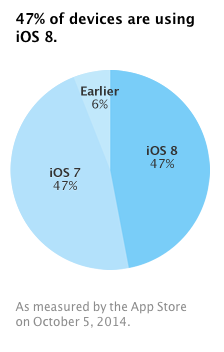iOS 8 usage figures showing signs of stress, fragmentation after initial uptick

The latest figures from Apple show iOS 8 usage has grown just 1 percentage point in three weeks.
Less than half of all compatible iPhones and iPads are now running Apple's latest mobile operating system released in mid-September, the company's developer pages show.
Usage is now neck-and-neck between iOS 8 and iOS 7, the last major release, which also stands at 47 percent. The remaining 6 percent accounts for older devices which on the most part are not compatible with the latest software.

The last time Apple reported its iOS 8 usage figures was on September 23, when usage rocketed to 46 percent in just four days.
The iPhone and iPad maker could not be reached for comment.
Apple says on its developer pages that it measures usage from App Store visits over a period of time. Figures are typically released every two or three weeks. iOS 8, which comes reinstalled on the iPhone 6 and iPhone 6 Plus, has been dogged with problems from its initial release.
Within a month of the software's debut, Apple released a minor update, iOS 8.0.1, to fix issues relating to its HealthKit platform, among other bugs.
But users were quick to complain that cell service on their new devices and Touch ID would not work.
The company took hours to pull the over-the-air update, and a further two days to issue iOS 8.0.2, which fixed all outstanding issues.
Apple said fewer than 40,000 people were affected by the botched update.
These issues alone could be a motivating factor in millions of users avoiding the upgrade. Other features, such as Apple's "Handoff" feature, which was postponed at iOS 8's release until an expected October launch, also may be driving existing iOS 7 customers away from upgrading until the final and finished feature set is released.
But Apple's slow uptick in iOS 8 adoption poses a problem for the company: fragmentation.
The iPhone and iPad maker has often jabbed at its smartphone platform rival, Google-owned and developed Android, for fragmentation issues with its platform.
A combination of incompatible devices and slow carrier updates has left the Android ecosystem struggling to ensure older devices are on the latest version of the open-source mobile operating system.
Apple's chief executive Tim Cook recently said at the company's annual developer conference, WWDC, citing ZDNet's Adrian Kingsley-Hughes, that Android is a "toxic hellstew" of vulnerabilities and security issues, which updates typically fix.
According to Google's latest figures on Android adoption, Android's latest version, dubbed "KitKat," now runs on around one in five compatible devices. But by that count, the remaining four-fifths run older versions of the software — with about 13 percent still running some iteration of Android "Gingerbread," which was released in late 2010.
Until Apple's latest software evens out and confidence levels rise, the technology giant may face some harsh critique of its own from its smartphone rival.